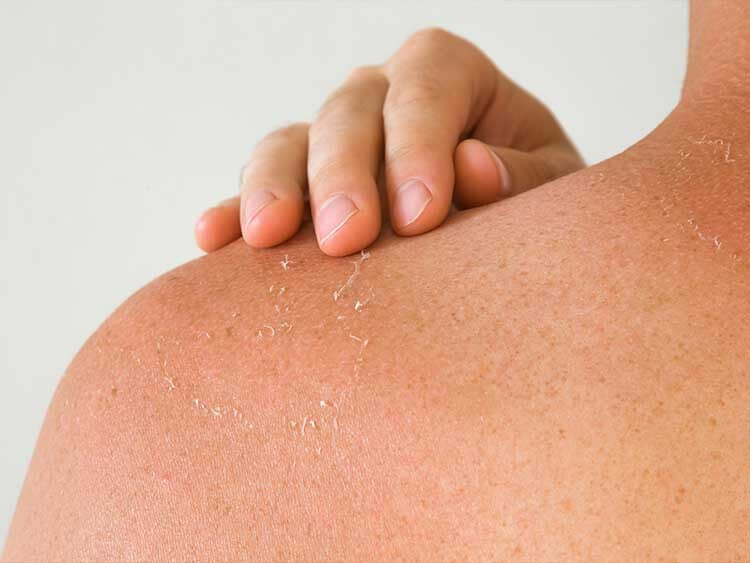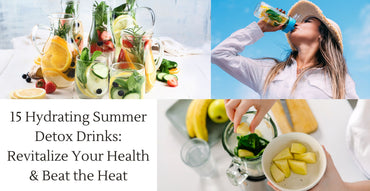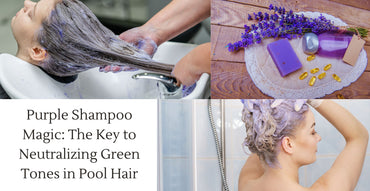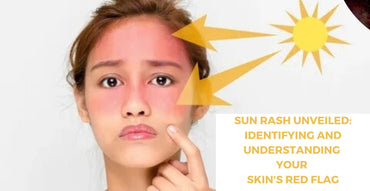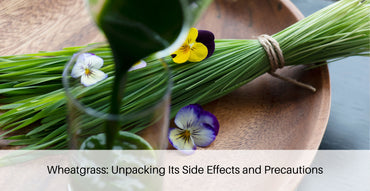Preventing forehead wrinkles entails developing proactive skincare habits and making lifestyle choices that promote skin health and reduce premature ageing. This blog will go over some preventative measures you can take.
Understanding the Causes of Forehead Wrinkles
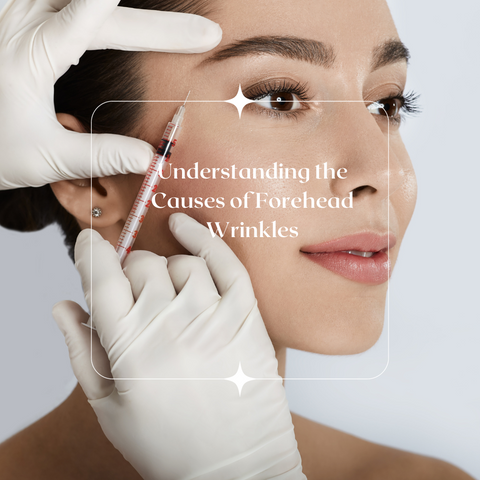
Face expressions, ageing, sun exposure, heredity, smoking, dehydration, sleeping positions, and lifestyle variables can all cause forehead wrinkles. Understanding the origins of forehead wrinkles might help you implement preventative measures and skincare practises to reduce their appearance. Sun protection, a healthy diet, a skincare routine that supports hydration and collagen formation, and minimising repetitive facial expressions are all important measures for eliminating forehead wrinkles.
Age-Related Changes and Their Impact on Skin
The skin changes as people age, and these changes are influenced by both intrinsic (internal) and extrinsic (external) factors. These changes can have an impact on the skin's look, texture, and overall health. Reduced collagen and elastin production, thinning of the epidermis, decreased sebum production, decreased skin cell turnover, loss of facial fat, changes in pigmentation, decreased blood circulation, loss of elasticity and firmness, increased vulnerability to UV damage, and the appearance of fine lines and wrinkles are some of the age-related changes and their effects on the skin. While some age-related changes are unavoidable, adopting a solid skincare routine, protecting the skin from the sun, being hydrated, and living a healthy lifestyle can help mitigate some of the effects and support overall skin health as you age. Furthermore, skincare products containing chemicals such as retinoids, antioxidants, and moisturisers might be effective in addressing specific ageing skin issues.
The Role of Sun Exposure in Skin Aging
Sun exposure contributes significantly to skin ageing, and the results are commonly referred to as photoaging. While some skin ageing is a normal and inherent process, sun exposure increases the appearance of certain indications of ageing. Sun exposure causes wrinkles and fine lines, loss of elasticity, hyperpigmentation, sun spots and age spots, burst blood vessels, skin thinning, dehydration and dryness, and an increased risk of skin cancer. It is crucial to note that UV rays can penetrate glass even on cloudy days, implying that sun protection is required all year, not only on bright days. To protect the skin from sun damage and slow the ageing process, it is best to:
-
Sunscreen: Use a broad-spectrum sunscreen with a high SPF on a regular basis, even on cloudy days.
-
Seek Shade: Limit direct sun exposure, especially between 10 a.m. and 4 p.m.
-
Wear Protective Clothing: Wear clothing, hats, and sunglasses to cover exposed skin.
-
Avoid Tanning Beds: UV exposure from man-made sources, such as tanning beds, contributes to skin ageing and increases the risk of skin cancer.
By using sun-safe behaviours, people can lessen the chance of skin cancer from sun exposure and prevent premature ageing of their skin.
Expression Lines: More Than Just Smiles and Frowns
Expression lines, also known as dynamic wrinkles, are lines and creases that emerge on the skin as a result of frequent facial movements and expressions. While smiles and frowns are common causes of these lines, other facial expressions and muscular contractions can also contribute to the formation of expression lines. Smiling lines (Crow's Feet), frown lines (Glabellar Lines), forehead lines (Horizontal Lines), laugh lines (Nasolabial Folds), marionette lines, chin lines, and smoker's lines are some significant elements and facial emotions that lead to expression lines. To preserve a healthy and young appearance, it is important to strike a balance between appreciating natural expressions and taking steps to care for the skin.
Effective Strategies for Wrinkle Prevention
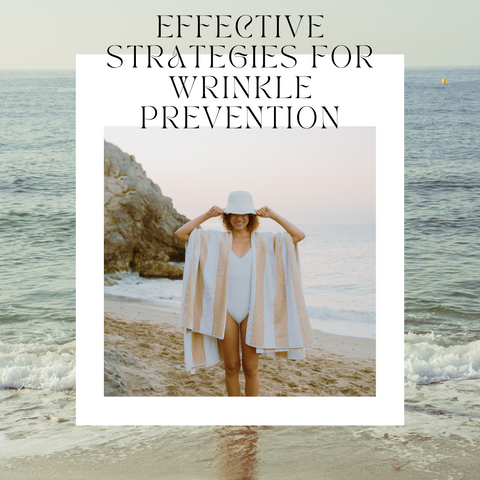
Wrinkle prevention entails a combination of lifestyle choices, skincare practises, and preventative measures. While it is natural for the skin to age, using effective tactics can help minimise wrinkle growth and boost overall skin health. Here are some wrinkle-prevention strategies:
-
Sun Protection: Even on cloudy days, use a broad-spectrum sunscreen with a high SPF. This protects the skin from the damaging effects of UV light, which is a primary cause of premature ageing.
-
Hydration: Drink plenty of water to keep your skin hydrated. Skin that is well-hydrated is less prone to dryness and the formation of fine wrinkles.
-
Healthy Diet: Consume an antioxidant-rich diet that includes fruits, vegetables, and omega-3 fatty acid-rich meals. Antioxidants aid in the protection of the skin from free radical damage.
-
Skincare Routine: Create a daily skincare routine that consists of gentle cleaning and moisturising. Moisturisers keep the skin's moisture barrier in place, avoiding dryness and dehydration. Consider using retinoids-containing skincare products, which can increase collagen formation and enhance cell turnover.
-
Avoid Smoking: Smoking hastens the ageing process and adds to wrinkle production, particularly around the mouth.
-
Limit Alcohol Consumption: Excessive alcohol consumption dehydrates the skin and speeds up the breakdown of collagen. Reduce your alcohol consumption to improve your skin's health.
-
Protective Clothing: Protect the face and eyes from the sun by wearing wide-brimmed hats and sunglasses with UV protection.
-
Facial Expressions: While expressing emotions is natural, repetitive facial movements might lead to the production of expression lines. Keep an eye out for squinting or recurrent muscle spasms in your face.
-
Adequate Sleep: Getting enough quality sleep is essential for overall health, and it contributes to skin regeneration and repair.
-
Dermal Fillers and Botox: Consider dermal fillers and Botox to address existing wrinkles and prevent future development by temporarily relaxing facial muscles or adding volume to specific areas.
-
Gentle Skincare Practices: Be gentle with your skin. Excessive use of harsh cleansers or exfoliation can strip the skin of its natural oils and cause irritation.
-
Regular Exercise: Exercise on a regular basis to increase blood circulation, which aids in the delivery of nutrients and oxygen to skin cells.
Daily Sunscreen: A Non-Negotiable for Youthful Skin
Sunscreen is an essential component of any skincare routine for maintaining youthful and healthy skin. Protection against UV radiation, prevention of premature ageing, reduced risk of skin cancer, prevention of hyperpigmentation, year-round protection, minimising of photoaging, prevention of sunburn, and maintaining skin health are just a few of the reasons why regular sunscreen application is important. Consider the following while choosing a sunscreen:
-
Select a broad-spectrum sunscreen that offers protection from UVA and UVB radiation.
-
For daily use, use a sunscreen with a Sun Protection Factor (SPF) of at least 30. Higher SPF values offer additional protection.
-
Choose a sunscreen that is water-resistant if you plan to swim or perspire a lot.
-
Apply sunscreen liberally to all exposed skin, and reapply every two hours or more often if swimming or sweating.
Daily sunscreen application is an essential step in preserving youthful and healthy skin, protecting against UV radiation's negative effects, and preventing premature ageing and skin malignancies.
Hydration Inside Out: Water and Moisturizers
Hydration is essential for healthy skin, and it includes not only drinking water but also applying moisturisers to keep the skin moist. Here's a summary of the importance of water consumption and moisturisers for moisturised skin:
Hydration from Within (Water Intake):
-
Cellular Function: Water is required for healthy cellular function, including that of skin cells. It aids in nutrient transfer, waste elimination, and cell health in general.
-
Moisture Retention: Sufficient hydration keeps the skin supple and elastic, which minimises the visibility of wrinkles and fine lines.
-
Toxin Removal: By removing toxins from the body, water helps to keep skin clearer by reducing blemishes and breakouts.
-
Balance and Regulation: It supports a number of biological processes and aids in controlling body temperature, both of which have an indirect impact on skin health.
Hydration from the Outside (Moisturizers):
-
Barrier Function: By covering the skin's surface, moisturisers prevent moisture loss and act as a barrier against irritants and pollutants from the outside world.
-
Humectants: Elements found in moisturisers such as glycerin, aloe vera, and hyaluronic acid draw and hold moisture to the skin, preventing it from drying out and becoming dehydrated.
-
Emollients: By bridging the spaces between skin cells, they improve the texture and appearance of the skin, softening and smoothing it.
-
Nutrient Delivery: Some moisturisers contain vitamins, antioxidants, and other beneficial ingredients that nourish the skin, promoting overall health and radiance.
Remember that keeping your skin hydrated requires both internal hydration (adequate water intake) and external care (the use of appropriate moisturisers). Balancing both factors can significantly contribute to healthy, glowing skin.
Facial Exercises: Can They Really Help?
Facial exercises have acquired popularity as a means of improving facial muscle tone, reducing indications of ageing, and improving the overall facial look. However, the efficiency of facial exercises in reaching these aims is still being debated among dermatologists and scientists.
Possible Advantages of Facial Exercises:
-
Muscle Strengthening: Facial workouts may help develop and tone facial muscles in the same way that regular exercise does. Proponents suggest that this might result in a more contoured appearance as well as tighter skin.
-
Better Circulation: Some people think that doing face exercises can improve blood flow to the face, which would make the skin look younger and healthier.
-
Relaxation and Stress Reduction: Relaxation methods, like controlled breathing, are frequently used in facial exercises. These methods help to relieve tension and stress in the facial muscles.
While some people report favourable benefits from facial workouts, empirical data to support their efficacy is sparse. As with any skincare practise, it's important to proceed with caution and consider incorporating face workouts into an entire skincare routine rather than relying only on these exercises for anti-aging or toning effects.
Incorporating Anti-Aging Tactics in Your Routine
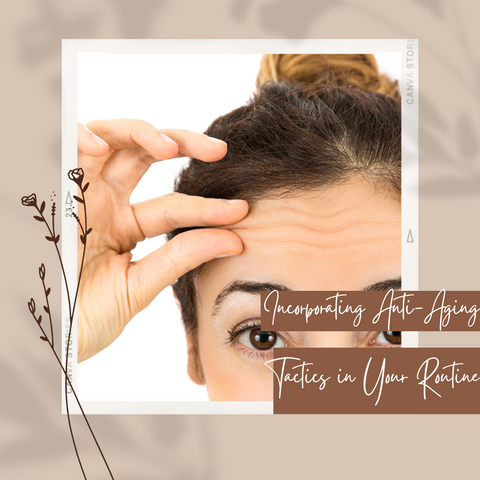
Incorporating anti-aging strategies into your daily routine necessitates a comprehensive approach that combines numerous skincare practises, good lifestyle habits, and preventative measures to promote youthful and healthy-looking skin. Here's a detailed guide to incorporating anti-aging strategies into your daily routine:
-
Cleaning: To remove dirt, makeup, and impurities without stripping natural oils, use a gentle cleanser appropriate for your skin type.
-
Moisturising: Use a hydrating moisturiser with ingredients like hyaluronic acid or ceramides to keep your skin hydrated and elastic.
-
Sun Protection: Apply sunscreen with an SPF of at least 30 every day to protect yourself from harmful UV rays, which are a leading cause of premature ageing.
-
Serums and Treatments: Serums containing antioxidants (such as vitamin C) or retinoids, which can help combat free radical damage and improve skin texture, should be considered.
-
Eye Cream: To target fine lines, puffiness, and dark circles around the eyes, use a specialised eye cream.
Healthy Lifestyle Habits:
-
Balanced Diet: To support skin health, eat a diet rich in antioxidants, vitamins (such as A, C, and E), omega-3 fatty acids, and plenty of fruits, vegetables, and lean proteins.
-
Hydration: Drink plenty of water every day to keep your skin hydrated and your overall health in check.
-
Regular Physical Activity: Exercise on a regular basis to improve circulation, which can contribute to healthier-looking skin.
-
Adequate Sleep: Make quality sleep a priority to allow the skin to repair and regenerate overnight.
Because everyone's skin is different, what works for one person may not work for another. It's critical to personalise your regimen to your skin type, issues, and specific requirements. Consultation with skincare professionals can assist in developing a more personalised anti-aging approach that is tailored to your specific needs.
Choosing the Right Anti-Aging Products
Choosing the correct anti-aging products is an important step in preserving youthful skin. Here's a guide to help you choose products that are specific to your skin's needs, such as identifying your skin troubles, understanding important ingredients, considering your skin type, SPF and sun protection, patch testing and gradual introduction, reading reviews, and seeking professional assistance. Pay attention to how your skin reacts to products and be patient, as benefits can take time to appear. Over time, tailoring your skincare routine with effective and appropriate products will help you achieve healthier, more youthful-looking skin.
Lifestyle Adjustments for Healthier Skin
Making lifestyle changes can substantially help you get healthier skin. Here are a few important lifestyle adjustments that can improve your skin's health:
Diet and Nutrition:
-
Hydration: Drink plenty of water to keep your skin hydrated and assist in eliminating toxins.
-
Balanced Diet: Eat a diet high in fruits, vegetables, lean proteins, and healthy fats to get the essential nutrients your skin needs.
-
Antioxidant-Rich Foods: Consume antioxidant-rich foods such as berries, leafy greens, nuts, and seeds to protect against free radical damage.
Sleep and Stress Management:
-
Adequate Sleep: Aim for 7-9 hours of quality sleep per night to give your skin time to repair and rejuvenate.
-
Stress Reduction: Use stress-relief techniques such as meditation, yoga, deep breathing exercises, or hobbies to manage stress levels, as chronic stress can affect skin health.
Skincare Routine:
-
Daily cleansing: Wash your face twice a day to remove dirt, oil, and impurities, preventing clogged pores and breakouts.
-
Sun Protection: Use sunscreen on a daily basis to protect your skin from UV rays, which can cause premature ageing and skin damage.
-
Moisturisation: Use a suitable moisturiser to keep your skin hydrated and maintain its natural moisture balance.
Exercise:
-
Regular Physical Activity: Exercise on a regular basis to improve blood circulation, which delivers oxygen and nutrients to skin cells and promotes a healthy complexion.
-
After-Workout Skincare: Cleanse your skin after sweating to prevent pores from becoming clogged and causing breakouts.
Habits to Avoid:
-
Smoking and Excessive Alcohol: Both can dehydrate the skin, reduce blood flow, and contribute to premature aging. Quit smoking and limit your alcohol consumption for healthier skin.
-
Touching Your Face: Avoid touching your face to prevent bacteria from spreading and reduce the risk of breakouts and irritation.
Hygiene Practices:
-
Clean Makeup Tools: Clean makeup brushes, sponges, and other tools on a regular basis to prevent the buildup of bacteria that can cause skin problems.
-
Change Pillowcases Frequently: Changing your pillowcases on a regular basis can help prevent the transfer of dirt, oil, and bacteria onto your face while you sleep.
These lifestyle changes can greatly contribute to healthy skin. Adopting these behaviours into your daily routine can help maintain and improve the general health and appearance of your skin over time. For the best outcomes, tailor these practises to your skin type and individual demands.
When to Consider Professional Dermatological Treatments
Consider professional dermatological treatments if you have unique skin concerns or want more advanced answers than normal skincare. Here are some situations in which getting expert dermatological therapy may be appropriate:
Persistent Skin Issues:
-
Acne: If over-the-counter acne treatments have not been effective, or if you have severe or cystic acne, a dermatologist can provide stronger treatments such as prescription medications, chemical peels, or laser therapy.
-
Rosacea or Redness: For effective management of persistent redness, flushing, or visible blood vessels, prescription medications, laser treatments, or light therapies may be required.
-
Eczema or Psoriasis: To control symptoms and prevent flare-ups, severe cases of eczema or psoriasis frequently require prescription-strength medications and therapies.
Aging-Related Concerns:
-
Fine Lines and Wrinkles: Dermatologists can treat wrinkles and restore skin volume with Botox, dermal fillers, laser resurfacing, or microneedling.
-
Sagging Skin or Loss of Firmness: Procedures such as radiofrequency treatments, ultrasound therapy, or certain types of lasers can help tighten and firm loose skin.
-
Hyperpigmentation or dark spots: Advanced treatments such as chemical peels, laser therapy, or intense pulsed light (IPL) treatments can target hyperpigmentation and even out skin tone.
Skin Health Evaluation:
-
Skin Cancer Screening: Regular check-ups with a dermatologist for skin cancer screenings are critical, especially if you notice any changes in moles, spots, or skin growths.
-
Overall Skin Assessment: If you are unsure about your skin type, have specific concerns, or want personalised skincare advice, a dermatologist can help.
Specialized Procedures or Therapies:
-
Scar Revision: Dermatologists use techniques such as laser therapy, dermabrasion, and injectable fillers to improve the appearance of scars caused by acne, surgery, or injuries.
-
Hair Loss or Scalp Issues: A dermatologist can identify the problem and recommend the best course of action for hair loss, alopecia, or scalp ailments.
Precautions and Tips:
-
Always seek professional advice and treatment from a qualified dermatologist.
-
Communicate your concerns clearly and ask questions to fully comprehend the recommended procedures or therapies.
-
Follow your dermatologist's post-treatment instructions for best results and to reduce risks.
-
Be realistic about expected outcomes, as some treatments may necessitate multiple sessions to produce visible results.
Beyond Skincare: Holistic Approaches to Prevent Wrinkles
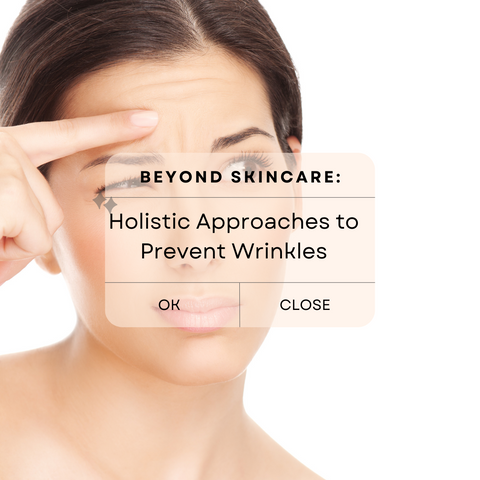
Preventing wrinkles requires a comprehensive approach that goes beyond cosmetics and includes lifestyle habits, food choices, and preventative measures. A holistic approach to wrinkle prevention combines a healthy lifestyle, sun protection, stress management, regular skincare routines, and thoughtful habits. By following these tips, you can help your skin's health and potentially minimise wrinkle formation while encouraging a youthful and beautiful complexion over time.
Stress Management and Its Impact on Skin Health
Stress can have a substantial impact on skin health in a variety of ways, often contributing to or exacerbating a variety of skin disorders. Here's a rundown of how stress affects the skin and how to deal with it:
Impact of Stress on Skin:
-
Accelerated Aging: Chronic stress can speed up the aging process, leading to the appearance of fine lines, wrinkles, and dull-looking skin.
-
Acne and Breakouts: Stress triggers the release of hormones like cortisol, which can increase oil production, leading to acne flare-ups and breakouts.
-
Skin Sensitivity and Irritation: Stress weakens the skin barrier, making it more susceptible to irritants, allergies, and inflammatory conditions like eczema or psoriasis.
-
Skin Dehydration: Stress can impair the skin's ability to retain moisture, resulting in dryness, flakiness, and an overall lack of radiance.
Stress Management for Better Skin Health:
-
Mindfulness and Relaxation Techniques: Engage in activities like meditation, deep breathing exercises, yoga, or tai chi to reduce stress levels and promote relaxation.
-
Regular Exercise: Physical activity helps in reducing stress by releasing endorphins, improving blood circulation, and benefiting overall skin health.
-
Adequate Sleep: Prioritize quality sleep to allow the skin to repair and regenerate, combating the effects of stress on skin aging.
-
Healthy Lifestyle Choices: Maintain a balanced diet, limit caffeine and alcohol intake, and avoid smoking, which can exacerbate stress and affect skin health negatively.
Managing stress is essential not only for mental and emotional well-being but also for maintaining healthy skin. By incorporating stress management techniques into your daily routine and prioritizing self-care practices, you can minimize the detrimental effects of stress on your skin, promoting a healthier and more radiant complexion.
Diet and Nutrition: Feeding Your Skin from Within
Diet and nutrition are important for maintaining skin health. Here are some nutrients and foods that can help your skin from within:
-
Antioxidant-Rich Foods: Rich in vitamin C, which brightens the skin and helps produce collagen, it can be found in citrus fruits, strawberries, bell peppers, and broccoli. Vitamin E is found in nuts, seeds, avocados, spinach, and other foods. It helps keep the skin healthy by shielding it from oxidative damage.
-
Omega-3 Fatty Acids: Fatty fish, such as salmon, mackerel, and sardines, are high in omega-3 fatty acids, which aid in inflammation reduction, skin elasticity, and hydration.
-
Hydration: Include hydrating foods such as cucumbers, watermelon, oranges, and tomatoes in your diet to help with skin moisture and overall hydration.
-
Beta-Carotene: Carrots, sweet potatoes, and pumpkins contain beta-carotene, a precursor to vitamin A that promotes skin health and a youthful appearance.
-
Zinc: Foods high in zinc, such as pumpkin seeds, chickpeas, lentils, and beans, aid in the healing of skin wounds and the maintenance of healthy skin.
-
Collagen-Boosting Foods: Collagen-rich bone broth can help with skin elasticity and hydration due to its collagen content.
-
Probiotics: Probiotics, which can be found in yoghurt, kimchi, and sauerkraut, promote gut health, which can benefit skin indirectly by reducing inflammation and improving overall health.
-
Green Tea: Green tea contains polyphenols, which protect the skin from free radical damage, potentially reducing signs of ageing.
-
Reducing Sugar and Processed Foods: Because high-glycemic foods can aggravate acne and skin inflammation, limiting sugar intake may benefit skin health.
By incorporating these skin-friendly foods into your diet, you can support overall skin health, improve complexion, and potentially reduce the risk of certain skin issues.
The Importance of Quality Sleep for Skin Regeneration
Quality sleep is essential for general health and plays an important role in skin regeneration and skin health maintenance. Here are some of the reasons why getting enough sleep is important for your skin: cellular repair and regeneration, hormonal balance, skin barrier function, dark circles, and puffiness. You can promote your skin's health and look by prioritising excellent sleep habits and getting enough rest, resulting in a radiant and rejuvenated complexion.

